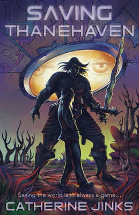Saving Thanehaven by Catherine Jinks

Allen and Unwin, 2014. ISBN 9781743317747.
(Age: Early secondary) Well recommended. This is a creatively
constructed, modern tale appealing to young readers who are familiar
with the workings of a computer but whose main characters belong to
a medieval world. Noble is the main character in a computer
game. He lives in a fantasy computer programme from long ago, where
swords smote characters. He sets out to save the Princes Lorellina
and meets Rufus, who belongs to the modern computer time and who
says, 'I'm not asking you to surrender. I'm asking you to think.'
p5. This is the essence of the book. The author challenges the
reader to question the computer games, the way they unfold and where
the power lies. Noble says,' It doesn't have to be tyranny or
anarchy. You can follow rules and still think for yourself'
p278. Noble has come a long way from his beginnings!
It's a very cleverly contrived novel, attempting to challenge young
readers about their game choices.
Catherine Jinks writes persuasively, using humour which the reader
understands, while developing strong characters. The cover imparts a
mysterious feeling suggesting a quest.
The Cover Story in The Weekend Australian dated September
13-14 by Rosemary Neill, while ostensibly discussing teen
films refers to these films as 'going dystopic'. They are
'high-concept tales set in quasi-totalitarian societies and
featuring teenagers fighting each other to the death'. This book
belongs to this genre. John Marsden's Tomorrow series began this
trend. David Kelly, (in this article) says 'dystopias reflect
'our anxieties of where we are heading and what's to come - a grim
prospect these days, with our customary apprehensions ratcheted up
by the 24-hour news cycle and the public appetite for stories of
political, social or personal (often celebrity) crisis'. This
article is relevant, topical and well worth reading.
Sue Nosworthy